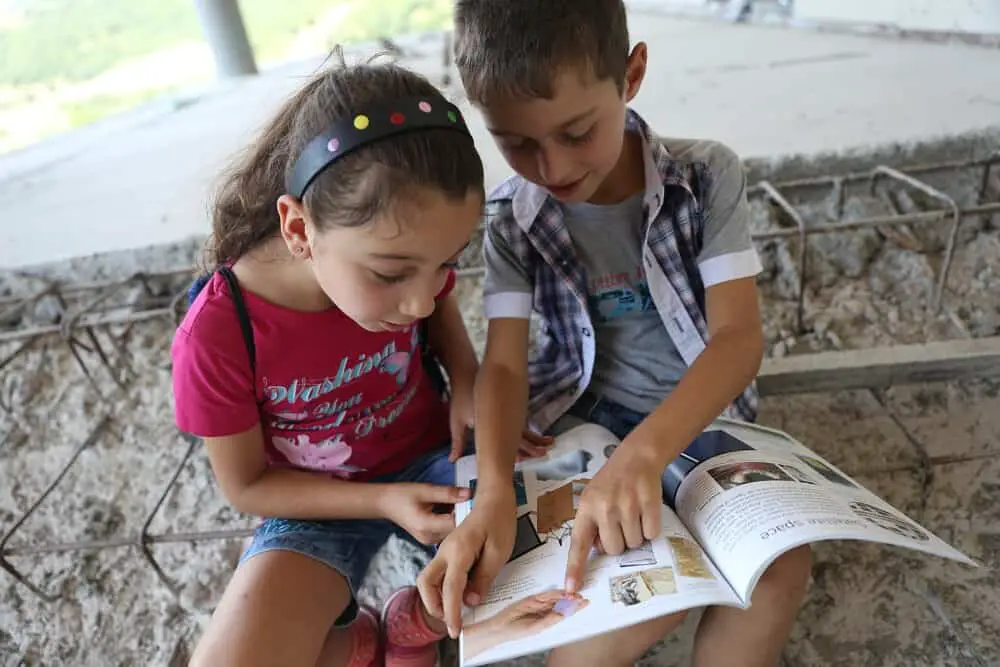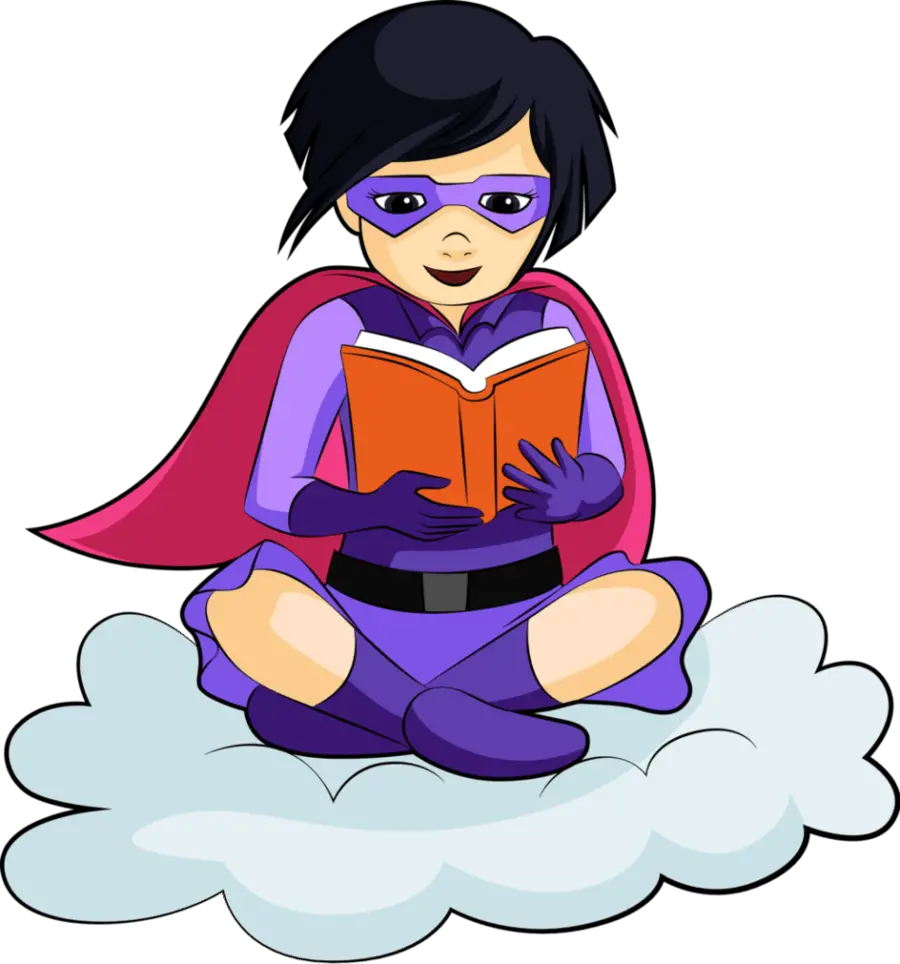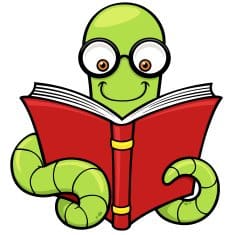
Did you know that 42% of people never read a book after graduating college? And that one of the biggest predictors of high school graduation was being proficient in reading when in 3rd grade? Some studies say reading reduces stress by 68%. What do these statistics really mean about reading, then?
Reading books is worth it in comparison to not reading. Research tells us that reading books makes us smarter by building vocabulary and comprehension skills, as well as teaches us empathy for and about differences of people. It is also an inexpensive, if not free, source of entertainment.
Most of us grew up being told, if not indoctrinated, that READING IS FUNDAMENTAL (RIF), that it’s a worthwhile activity for everyone. But is this factual, or just hype? And as we get older, is reading actually worth it?
Contents
Reading Books Is Worth it Over Movies, Right?
People rate books over their movie translation 74% of the time. When you read a book, you visualize based on text how characters and settings look and you are able to transform the page into full-fledged scenes mentally.
My son, Ethan, who has autism and struggles with reading, likes to say he’s making movies in his mind and that his movies are better than the real thing. Even though he’s not an avid reader, I think he aptly phrased how most readers feel.
Thus, I’m not surprised that movie makers are challenged to bring print to screen. Even if they follow a book painstakingly, they can never replicate what’s going on in each reader’s mind. As well, it’s near impossible to include all of the detail in movies that are first written in the books.
So, if you are comparing same stories told from a book and movie, then overwhelmingly most people agree that the books are more thorough, detailed, and interesting.
This is generally true even in instances when it goes the other way…when books are written after the movies. For example, in the Star Wars series, George Lucas first produced the movies. Because of their popularity, books came next.
Even when books are developed after the movies (as a result of the movies popularity), most everyone agrees the movies pale in comparison. You simply can’t elaborate as well in a movie as you can in the books.
Keeping this in mind, I must admit that some movies rival books in their accolades and support, though not surpassing them. Book and movie adaptations of such serials as The Lord of the Rings and Harry Potter, for example, have equal prominence.
I can say that I enjoy both, separately. In fact, a good book and good movie of the same title provide the reader and viewer two for the price of one!
As a teacher, I’d often show the movie after reading the book with the class. From Because of Winn Dixie by Kate DiCamillo (you can find the book or movie here on Amazon) with my third graders to William Shakespeare’s Romeo and Juliet with my high schoolers, we’d read the book, then have a watch party complete with popcorn after.
Some students enjoyed the movie better, especially those who struggled with some of the visualization of certain parts, having lacked the background for the vocabulary or imagery of setting.
But most preferred the book in comparison. Nevertheless, all students seemed to relish in the words jumping off the page and into seeming ‘reality’ that only the magic of moviedom can show.
Reading Books CAN Make You Smarter
There’s no denying that there is some scientific evidence that reading makes you smarter. For example, this study from the Advancements in Child Study and Behavior by Keith Stanovich details how reading not only builds vocabulary in comparison to those who don’t read, but it actually has been proven via MRI scans to show increases in cognitive function.
If we consider the conventional definition of ‘smart’ as having a larger vocabulary and ability to recall facts, then reading certainly has been shown to support that. And supposedly reading doesn’t just support literacy.
Some studies have made correlations between good readers and high math scores. One study said that students in the top third of their class for reading were able to answer 70% more math problems correctly than students in the bottom third for reading proficiency. Are you surprised? I can’t really say that I am.
We have to remember that correlations don’t necessarily mean causation. The fact of the matter is, from my experience as a teacher, most students who read well do fairly well in all of their subjects including math. This is simply because reading is a foundation to other core content, a necessary skill before being able to do other things. Therefore, being top in reading aids in being able to do better in other areas.
As well, those who are avid readers are often studious and do well in school, period.
And to say that reading works the brain implies that other activities don’t, and this is simply not true. There is just as much scientific evidence that says music, art, and learning a foreign language grows the brain, thus ‘making you smarter.’
For example, this report by D.J. Levitin, titled This is Your Brain on Music, touts the advantages music has on cognitive function. And this one explains how learning a foreign language helps healthy older adults stave off Alzheimer’s disease and dementia.
Reading Books Is Worth It for Learning
A common saying that you’ll hear from teachers is that primary students learn to read, while older students read to learn. This means students move from first learning how to read letters, blends, digraphs and words to actually using reading as a tool to learn more about, well, other things.
Often as teachers of students who know how to read, we’d push students to nonfiction reading. This was one practical way to incorporate cross-curricular instruction and as the idiom goes, kill two birds with one stone.
Reading to Learn, Rather than Learning to Read
I’d gather books on ancient civilizations for my elementary reading groups in order to cover history units during reading time. It saved time instructionally by allowing me to cover two core content objectives together.
Other times I’d select books from our school library on weather, electricity, and erosion in order to cover science material while working on reading skills. Again, this push to read nonfiction was functional and practical. It didn’t necessarily mean I thought fiction wasn’t important, although looking back the practice might have unintentionally relayed this message.

However, recent research has expounded more benefits for including fiction, so as a teacher and confessed avid reader of fiction in my personal life, my interest was piqued.
Reading to Learn Empathy
Researchers have found evidence that fiction stories can actually improve a reader’s ability to understand what others are thinking and feeling, essentially helping them to put themselves in someone else’s shoes. But so far, evidence is more connected to literary fiction rather than genre fiction.
Nevertheless, as a teacher, I know I’ve seen my students become so engrossed in characters that they audibly sigh, groan, or squeal in delight, depending on what happens to the protagonist. When we read Stone Fox aloud, my students cried at the end when little Willie’s dog, Searchlight, is injured. I admit I shed a discreet tear, or two, also. (Here is the book link for Stone Fox on Amazon.)
I don’t really need to be convinced that readers can empathize with their characters, but whether or not the effects are long-lasting is yet to be determined.
Yet, psychologists and counselors now suggest, from current research, that fiction books be used as therapy for students struggling with social/emotional behaviors, and for those with disorders that affect their understanding of social norms, such as autism.
For Ethan, I’ve found success in having him read books with animal main characters. Through this, he’s able to make emotional connections and empathize when the character goes through struggles.
In my own teacher experience, I know our guidance counselors most often relied on reading books to my students in order to teach citizenship and social etiquette. Also, they would use short books to connect with students in their 1:1 or small groups sessions.
As part of my own teacher training, irrespective of my three degrees, I had to take 20 course hours from the school district on ‘Family Life Education.’ Whether or not, I support that requirement is entirely another thing, but I know the program relied upon me to incorporate a short story or picture book with each student lesson. If nothing else, I found that students are instantly engaged when you read them a story, no matter the moral or instructional lesson tied to it.
It is clear that education relies heavily on books to teach morality and social ideals.
Reading Books CAN Be a Time-Waster

Reading books truly can open worlds you never knew existed. From adventures with Lucy and Edmund in Narnia to casting spells with Hermione and Harry at Hogwarts, children who read learn quickly that you don’t have to leave their bedroom (or school grounds) in order to travel in time and/or space.
This is probably one of the first things teachers, if not parents, tell their kids when enticing them to read. I know I’ve found myself in faraway lands many days and nights, while never stepping foot out of the house nor talking to a single person in real life.
Reading books can teach you about different cultures and practices, as well as daily life.
But this can also be the dilemma of reading. Remember the image of the bookworm wearing glasses with his face focused on the pages of his book? I sure do! This is fine for the worm, but in reality, it’s not a healthy perspective for humans.

Someone with their head always in a book can use that as a shield to avoid social interactions and the less appealing parts of life.
Students who have trouble making friends can easily ignore it instead of seeking support to overcome the barriers they face by simply reading books. Instead of finding friends to sit with in the school cafeteria, they pull out a book to read. Or if they are really lucky, skip the cafeteria altogether and eat their apple in the library instead, with a multitude of books for friends.
I admit I have used books from time to time to avoid conversations, like when on a plane and in doctor’s offices, even while waiting for a meeting to start. Reading a book is an easy, socially-accepted avoidance tactic. This isn’t necessarily a problem if it’s in balance. But in some cases, it isn’t.
People who are depressed, have social anxiety, or insecurities often overlook treatment for those deficiencies by reading books.
Books allow them an escape from their current problems and help them ignore mounting pressures or responsibilities. In these instances, reading isn’t worth it!
Is Reading Books Worth It Wrap Up
As a teacher, I’ve long used books for instructional tools. It’s been my prized tool! In my personal life, I read A LOT. I’m certainly not advocating the abolition of books. But reading is not always worth it and is not always called for. Let’s recap:
- Reading is worth it over movies.
- Reading is worth it for growing your brain (but so is music, art, and learning a new language).
- Reading is worth it to learn about other things- to learn about history, scientific concepts, and new skills.
- Some studies show that reading fiction builds empathy. Reading fiction can be worth it for those who need to practice emotional connection.
- Reading takes you on adventures without leaving your home.
- But reading isn’t worth it if you use it to escape problems and responsibilities.
So feel free to grab a book from the shelf and dive in! I’m happy to share some of my recommendations with you. But please, keep it in balance!
